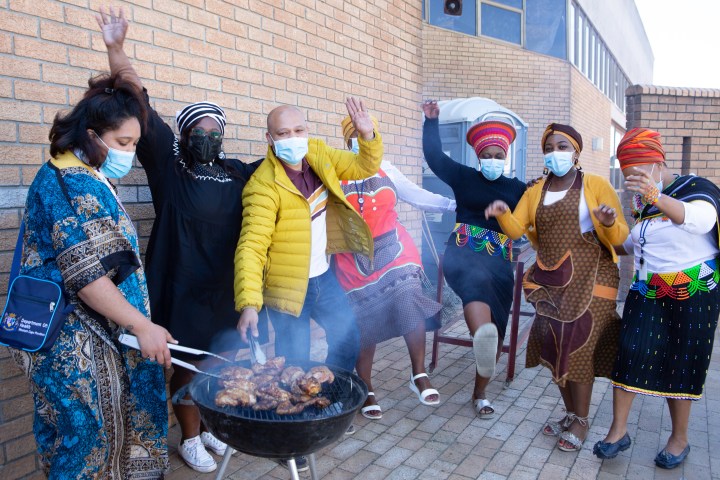VICTIM NATION OP-ED
Is it still yesterday in South Africa? The meaning – if anything – of being South African today

Ever since Europeans first settled at the southern tip of Africa, we appear to have generated more troublesome history than we can consume or digest. As a result, our past has not been laid to rest, which explains the sound and fury when disputes erupt in the present.
Sometimes it’s easier to start with what we are not. In Playing in the Dark: Whiteness and the Literary Imagination, the late Nobel Laureate Toni Morrison wrote, “deep within the word ‘American’ is its association with race. To identify someone as South African is to say very little; we need the adjective ‘white’ or ‘black’ or ‘coloured’ to make our meaning clear. In this country it is quite the reverse. American means white, and Africanist people struggle to make the term applicable to themselves with ethnicity and hyphen after hyphen after hyphen.”
Nevertheless, for us, the question lingers: in the 21st century can we really speak of South Africans as a generalisation – or do we still have to add, as Morrison noted, “white”, “black” or “coloured” to make our meaning clear?
Njabulo Ndebele, the former vice-chancellor of the University of Cape Town, refined this point in Fine Lines from the Box, observing that it is an “old habit” to associate “South African” with one segment of the population. This is particularly true of whites, who easily assume that their lifestyle and customs represent the peaks of aspiration. At worst, this breeds an essentially colonial attitude. At best, it fosters citizens who are, in JM Coetzee’s phrase, “no longer European, not yet African”.
The difficulty of finding solid middle ground, where all can meet with enough in common to move forward, can be seen every year on Heritage Day. In 1996, when our newly democratic Parliament proposed a list of public holidays, the IFP objected that remembrance of Shaka, observed in KwaZulu-Natal on 24 September, was not included. As a national Shaka Day was deemed potentially culturally and racially divisive, the compromise agreed on the Shaka date – but as “National Heritage Day”. A celebration, boasts the government website, of our many cultures.
Instead, it’s become a day of forgetting. Apart from some dull political posturing, most regard 24 September as a day off work, with the result that the event has been hijacked as National Braai Day.
Rather than a symbolic affirmation of national unity, and with no consensus over any fuzzy “heritage”, it’s a meaningless dead end. As designated “South Africans”, it’s apparent that we have yet to emerge from under the dead weight of our history.
Yesterday, today and tomorrow
Reflecting a sinister echo from 19th-century South Africa, the protest cry of “Get your knee off my neck” reverberated round the world after a white American policeman killed an African American by placing his knee on the man’s neck for eight minutes.
That precise ritual of humiliation was performed by Sir Harry Smith, governor of the Cape Colony. Having served in the Sixth Frontier War against the Xhosa people, Smith returned in 1848 as governor and in Port Elizabeth, among the crowd gathered outside his hotel, Sir Harry spotted an old adversary, the Ngqika chief Maqoma.
Read in Daily Maverick: “The history of Africa is central to the story of the modern world — Africa needs to write itself back into history”
In his comprehensive work Frontiers: The Epic of South Africa’s Creation and the Tragedy of the Xhosa People, Noël Mostert recorded: “Maqoma was forced to prostrate himself before the Governor who, placing his foot upon his neck, declared, ‘This is to teach you that I have come to teach Kaffirland that I am chief and master here, and this is the way I shall treat the enemies of the Queen of England’.”
Along with the stripping of pride and seizure of land over several centuries, there was a relentless process of cultural and spiritual asphyxiation. As a result, disputes about colonialism rumble on, accompanied by mutual incomprehension and anger, with retrospective justifications on one side and recriminations on the other.
Perhaps the problem is reflected in the quip from a short story by the satirist Saki: “The people of Crete unfortunately make more history than they can consume locally.” Ever since Europeans settled at the southern tip of Africa, we appear to have generated more troublesome history than we can consume or digest. As a result, our past has not been laid to rest, which explains the sound and fury when disputes erupt in the present.
In The Café de Move-on Blues: In Search of the New South Africa, Christopher Hope remarks: “South African history is difficult to explore as a chronicle of past events because it is more like analysing a crime scene. There are cover-ups, frightened witnesses, tainted evidence, and testimonies are riddled with subterfuge and deception.” Later, he concludes that “historical analysis is very often war by other means”.
Consequently, in the fierce skirmishes a few years ago over bronze likenesses of dead white men, our past proved a febrile battlefield for the present. It was a proxy war. Iconoclasts (mostly black) wished to tear down graven images, while iconophiles (mostly white) defensively vouched for – and even venerated – those images.
Yet despite all the statues assaulted throughout the country, including one of Gandhi, those of Jan van Riebeeck and his wife in Cape Town remained curiously unscathed. The damage, in fact, had occurred in 2001 when a bronze plaque on Jan’s plinth vanished. Although a theft in order to melt the bronze for sale as scrap metal, it was also an act of unintended historic correction.
That plaque, in Afrikaans, had crowed: “In memory of Jan and Maria van Riebeeck, who brought Christianity and Western Civilisation to South Africa, the country’s two most important assets.”
As lies go, it was a whopper. Van Riebeeck came unwillingly, with no intention of importing “Western Civilisation” or “Christianity”, but with every desire to escape as soon as possible from what he considered, in Donald Trump’s snappy insult, a “shithole”.
Our past stubbornly seals off so many into mutually excluding attitudes. A symptom of our lingering babelas is that – whether left, right or centre – we tend to jump to the direst conclusions, reaffirming Hope’s aphorism in White Boy Running, his classic account of life under apartheid: “It is always yesterday in South Africa.”
Learning the wrong lessons
In his book, Inglorious Empire (2007), a former under-secretary-general of the UN, Shashi Tharoor, now an Indian MP, makes the shrewd observation: “One of the lessons you learn from history is that history sometimes teaches the wrong lessons.”
When the rapacious British East India Company first muscled in on India during the 18th century, the subcontinent contributed an estimated 23% of world trade. When the British left in 1947 this had dwindled to 3%. The result, says Tharoor, was that Indian nationalists associated capitalism with subjugation, so that “India spent the first 45 years with bureaucrats rather than businessmen on the ‘commanding heights’ of the economy, wasting the first four-and-a-half decades after independence in subsidising unproductivity, regulating stagnation and trying to distribute poverty”. They had, says Tharoor, learnt the wrong lesson.
Visit Daily Maverick’s home page for more news, analysis and investigations
A similar miscalculation seems to have stalled South Africa. When Nelson Mandela first went to Davos, he was eager to meet the Chinese delegation, telling them how delighted he was to meet some true communists, as there seemed to be so few left. Embarrassed, the Chinese quietly informed him that they weren’t really communists any longer.
A shocked Mandela later confessed to businessman Johann Rupert: “They might as well have told the Pope there is no life after death.”
Disastrously South Africa, since shucking off the shackles of apartheid, has been “subsidising unproductivity, regulating stagnation and trying to distribute poverty”.
The past is not a syllabus for our instruction. Yet it seems that one lesson, ever since 1652, is that blacks and whites tend to draw radically differing conclusions.
A litany of victims
“I don’t know why so many Commandos come into this country and take away our cattle and kill our people… We do no injury to the colony, and yet I remain under the foot of the English.” – Chief Maqoma, letter published in the South African Commercial Advertiser (1833).
South Africa has experienced a protracted chronicle of oppression, a vast residue of humiliations. Yet perversely, throughout the 20th century and up to the present, there’s a link between conflicting ruling groups at different times: a continuum shared by all governing classes, black or white, of resentment and victimhood.
Afrikaners bitterly resented British rule following the Anglo-Boer War, and their sense of victimhood nurtured a powerful nationalist drive for political power. Military defeat, the condescension of British officials, a deep distrust of Randlords and international capitalism combined to foster fears of economic, social and cultural marginalisation.
Through an intensive drive of “affirmative action”, a wide range of Afrikaner power bases were created in banking, industry and cultural networks. Even so, a strain of resentful victimhood remained palpable during the apartheid years.
Meanwhile, the majority of English-speaking whites, despite wielding great economic power, felt querulously excluded from the centre of government influence, long considered their prerogative. This resentment was commonly expressed in the litany of derogatory terms for Afrikaners (“hairybacks”, “rockspiders”, etc), along with complaints about the crudity of National Party racial policies.
English-speakers thus gave themselves the luxury of carping about the brutality of Afrikaner nationalism while reaping the benefits of the regime’s repression. This double-sided convenience was confirmed by the steady increase of votes for the National Party in successive whites-only elections, thanks to the growing support from English-speakers.
Read in Daily Maverick: “‘Lost on the Map’ — A memoir of colonial illusions”
The lure of resentment persists among many whites today, particularly older ones used to being part of an unquestioned pigmentocracy. A sense of victimhood among well-heeled white suburbanites is commonly expressed by assertions that they now suffer from “reverse apartheid”. The possession of material well-being has never been an impediment to self-pity or self-justifying perceptions of persecution.
Paradoxically, the ANC, in power for more than a quarter of a century, also frequently manages to sound as though they are still victims. This was not something indulged by Nelson Mandela, even during his long years in prison.
But a peevish tone crept in with Thabo Mbeki, sounding as though he was in office but not in power. And Jacob Zuma made victimhood his validation, a remarkably successful ploy both during and after his presidency. He plays the eternal victim, a casualty of conspiracies from “white monopoly capital”, unnamed foreign agents, sinister international plots, a host of biased or corrupt judges, as well as treacherously envious former comrades.
Others learnt from Zuma, with the “innocent till proven guilty” trooping into the Zondo Commission when fingered for looting state funds, managing to sound hurt, misunderstood and mistreated. In short, victims of dark and malevolent forces. The question is: why does posing as a victim work so well in South Africa?
A colonial hangover
The most likely answer is that the status of being a victim resonates with the long experience of the black majority. This goes back to the first encounters between Europeans and indigenous peoples, the Khoikhoi and San.
It continued through the exploitation of slavery to the inexorable encroachment of colonists into Xhosaland and beyond, with the resulting stripping of black land and dignity, until the idea of white racial superiority became a state dogma.
That great swathes of the black population have not benefited from a black government, or that colossal sums of money intended for alleviating poverty have been embezzled by people posing as revolutionaries is one of the grim ironies of our time: a trauma not yet played out.
Until the day of reckoning dawns, we will continue to stumble along, coping with proliferating dysfunctionality. Brawls over colonialism will rumble on because they have far less to do with trying to understand the past than a desire to validate opposing attitudes in our messy present.
After all, most of our daily misconceptions are reflected in the quip by the Italian statesman Massimo d’Azeglio, following the unification of Italy in 1861: “We have made Italy, now we must make Italians.”
Clearly more than a quarter of a century after our democratic Constitution finally conceded that everyone of any colour was a citizen, we have yet to make South Africans.
In our ever-rambunctious Republic, that remains a fragile, much-fudged work in progress. DM
Bryan Rostron has worked as a journalist in Italy, New York, London and South Africa, writing for Business Day, Daily Maverick, The New York Times, The Guardian, The Spectator, and Private Eye. He was the South African correspondent for the New Statesman and is the author of six books including Robert McBride: The struggle continues, The Ranter’s Guide to South Africa and a novel, Black Petals.




















 Become an Insider
Become an Insider
When the writer asks the question “why does posing as a victim work so well in South Africa?” he misses something more fundemental: posing as a victim does not only work well here in South Africa, it works well in all countries. Indeed it is an integrated part of humanity in general. From the conservative americans who believe they are the victims of a “culture war” against an all powerful liberal elite to the Shahs of Iran who believe they are the victims of a ideological war on their islamic values to the CCP who believe they are a victim of western humiliation and subjugation.
Unfortunately it is embedded in our psychology to naturally identify as victims, liberal and conservative alike, and it’s only cure is for people to begin understanding themselves, their cognitive biases and begin freeing themselves from their deepest irrational fears.